- Home
- Charlaine Harris
Sweet and Deadly
Sweet and Deadly Read online
“Harris writes neatly and with assurance, and she avoids the goo that makes equivalent books so sticky.”
—The New York Times Book Review
“Packs a perennial punch. It offers a rarity in popular fiction: an unromanticized portrait of a Southern girl.”
—The Philadelphia Inquirer
“Introducing an author of rare talents, this mystery is set in a small town on the Mississippi Delta that Harris makes excitingly real…Harris artfully keeps the mask on the killer until the stunning conclusion.”
—Publishers Weekly
“Sweet and Deadly combines astute depiction of a Southern town with a crackling good mystery plot…Sweet and Deadly has a little of everything: rich regional authenticity, good dialogue, interesting characters instead of stereotypes, and taut suspense. The heroine is a self-sufficient woman who can shoot a gun and has true grit. The sheriff is a well-drawn character and so is the killer, whose motive will stun the reader. Charlaine Harris has a great future as a writer.”
—Savannah News-Press
“Sweet and Deadly is billed as ‘a Southern mystery,’ and it does have that slow, sittin’-in-the-shade quality as it lazily rolls to a shocker ending.”
—The Des Moines Register
“As much novel as mystery, it explores the complex characters and secrets of a small Southern town.”
—The Wichita Eagle-Beacon
“Charlaine Harris is a name to remember, not only because she has written an engrossing first novel about multiple murders but also because she has set that mystery in a small Southern town that Southern readers will find familiar and credible.”
—The Macon Telegraph & News
“Engaging. Harris’s style has a charm and ease that remind one of Anne Tyler…original and surprising. Traces of gothic romance add to the book’s unusual flavor.”
—The Christian Science Monitor
Praise for Charlaine Harris’s
Southern Vampire series
featuring Sookie Stackhouse
“The goofy charm of Harris’s world, with its humor and occasional terror, is what makes Dead Until Dark so delightful.”
—The Denver Post
“Harris brings off this blend of mystery and vampires better than most.”
—San Francisco Chronicle
“A fun, fast, funny, and wonderfully intriguing blend of vampire and mystery that’s hard to put down, and should not be missed.”
—Susan Sizemore, author of the Laws of the Blood series
“Fans of Laurell K. Hamilton’s Anita Blake looking for a lighter version of the vampire huntress should cotton to Sookie Stackhouse…Consistent, well-built characters and a strong, action-packed plot that will keep readers guessing to the end distinguish this frothy fusion of romance, mystery, and fantasy.”
—Publishers Weekly
Praise for
Charlaine Harris’s
Harper Connelly Mysteries
“Too much fun.”
—Wilmington (NC) Star News
“Harris debuts a series that just might surpass all her others in popularity…Will have readers dying for more.”
—Booklist
“Fast pacing, excellent character development, and a strong story line…This fabulous opening gambit affirms that every series Charlaine Harris creates is utterly fantastic.”
—Midwest Book Review
“Harris delivers a knuckle-gnawing tale, populated with well-developed, edgy characters. A nifty puzzle towards the end will challenge even the most jaded mystery buffs.”
—Publishers Weekly
“Has all the warmth and finesse of [the author’s] Southern vampire series—as well as a good deal of their down-home Southern charm.”
—Roundtable Reviews
Ace books by Charlaine Harris
DEAD UNTIL DARK
LIVING DEAD IN DALLAS
CLUB DEAD
DEAD TO THE WORLD
DEAD AS A DOORNAIL
Berkley Prime Crime books by Charlaine Harris
SWEET AND DEADLY
SHAKESPEARE’S LANDLORD
SHAKESPEARE’S CHAMPION
SHAKESPEARE’S TROLLOP
SHAKESPEARE’S COUNSELOR
GRAVE SIGHT
GRAVE SURPRISE
Sweet and Deadly
Charlaine Harris
BERKLEY PRIME CRIME, NEW YORK
THE BERKLEY PUBLISHING GROUP
Published by the Penguin Group
Penguin Group (USA) Inc.
375 Hudson Street, New York, New York 10014, USA Penguin Group (Canada), 90 Eglinton Avenue East, Suite 700, Toronto, Ontario M4P 2Y3, Canada
(a division of Pearson Penguin Canada Inc.)
Penguin Books Ltd., 80 Strand, London WC2R 0RL, England
Penguin Group Ireland, 25 St. Stephen’s Green, Dublin 2, Ireland (a division of Penguin Books Ltd.)
Penguin Group (Australia), 250 Camberwell Road, Camberwell, Victoria 3124, Australia
(a division of Pearson Australia Group Pty. Ltd.)
Penguin Books India Pvt. Ltd., 11 Community Centre, Panchsheel Park, New Delhi—110 017, India
Penguin Group (NZ), 67 Apollo Drive, Mairangi Bay, Auckland 1311, New Zealand
(a division of Pearson New Zealand Ltd.)
Penguin Books (South Africa) (Pty.) Ltd., 24 Sturdee Avenue, Rosebank, Johannesburg 2196,
South Africa
Penguin Books Ltd., Registered Offices: 80 Strand, London WC2R 0RL, England
This is a work of fiction. Names, characters, places, and incidents either are the product of the author’s imagination or are used fictitiously, and any resemblance to actual persons, living or dead, business establishments, events, or locales is entirely coincidental. The publisher does not have any control over and does not assume any responsibility for author or third-party websites or their content.
SWEET AND DEADLY
A Berkley Prime Crime Book / published by arrangement with the author
Copyright © 1981 by Charlaine Harris Schulz.
Excerpt from All Together Dead © 2007 by Charlaine Harris Schulz.
Cover art by Diane Fenster.
All rights reserved.
No part of this book may be reproduced, scanned, or distributed in any printed or electronic form without permission. Please do not participate in or encourage piracy of copyrighted materials in violation of the author’s rights. Purchase only authorized editions.
For information, address: The Berkley Publishing Group,
a division of Penguin Group (USA) Inc.,
375 Hudson Street, New York, New York 10014
ISBN: 1-4295-0620-2
BERKLEY® PRIME CRIME
Berkley Prime Crime Books are published by The Berkley Publishing Group,
a division of Penguin Group (USA) Inc.,
375 Hudson Street, New York, New York 10014.
The name BERKLEY PRIME CRIME and the BERKLEY PRIME CRIME design are trademarks belonging to Penguin Group (USA) Inc.
To Hal, who made this possible
CONTENTS
Chapter 1
Chapter 2
Chapter 3
Chapter 4
Chapter 5
Chapter 6
Chapter 7
Chapter 8
Chapter 9
Chapter 10
Chapter 11
Chapter 12
Chapter 13
1
S HE PASSED A dead dog on her way to the tenant shack.
It was already stiff, the legs poker-straight in rigor. It had been a big dog, maybe dun-colored; with only a quick glimpse, Catherine could not be sure. It was covered in the fine powdery dust that every passing vehicle threw up from the dirt road in t
he dry Delta summer.
In her rearview mirror she saw the cloud raised by her passage hanging in the air after she had passed, a cloud dividing endless rows of cotton. But the road was too poor to allow many backward glances.
She wondered briefly why someone had been driving so fast on the caked and rutted dirt that he had not seen the dog in time to swerve.
A sideways look at the cotton told Catherine that it would make a sad crop this year. The heat had lasted too long, unbroken by rain.
This land was Catherine’s, had been her great-grandfather’s; but Catherine rented it out as her father had done. She was glad she did as she recalled her grandfather’s irascibility in bad years, when she had ridden with him across “the place,” as cotton planters called their acres.
She didn’t remember the heat of those dim summers equaling the ferocity of this one. Even this early in the morning, with dawn not too long past, Catherine was beginning to sweat. Later in the day the glare would be intolerable, without considerable protection, to all but the swarthiest. To someone of Catherine’s whiteness of skin it would be disastrous.
She pulled to a stop under an oak, killed the motor and got out. The oak was the only tree to break the stretch of the fields for miles. She stood in its sprawling shadow with her eyes closed, the heat and silence enveloping her. She wrapped herself in them gladly.
The silence came alive. A grasshopper thudded its way across the road from one stand of cotton to the next. A locust rattled at her feet.
She opened her eyes reluctantly and, after reaching into the car for the things she had brought with her, began to walk down the road to the empty tenant shack standing to one side of the intersection of two dirt roads.
The fields were empty of tractors and farm hands. Nothing stirred in the vast brilliant flatness but Catherine.
The sack in her left hand clanked as she walked. The gun in her right hand reflected the sun.
Her mother had raised her to be a lady. Her father had taught her how to shoot.
Catherine laid the gun on a stump in the packed-dirt yard of the tenant house. The bare wood of the house was shiny with age and weathering. A few traces of red paint still clung in the cracks between the planks.
It’ll all fall down soon, she thought.
The outhouse behind the shack had collapsed months ago.
Under the spell of the drugging heat and hush, she made an effort to move quietly. The clank of the empty cans was jarring as she pulled them out of the sack and set them in a neat row across the broad stump.
She hardly glanced at the black doorless hole of the shack’s entrance. She did notice that the sagging porch seemed even closer to deserting the rest of the house than it had the last time she had driven out of town to shoot.
The dust plumed under her feet as she paced away from the stump. She counted under her breath.
A trickle of sweat started down the nape of her neck, and she was irritated that she had forgotten to bring an elastic band to lift the black hair off her shoulders.
The twinge of irritation faded as she turned to face the stump. Her head bowed. She concentrated on her body’s memory of the gun.
In one motion, her head snapped back, her knees bent slightly, her left hand swung up to grip her rising right forearm, and she fired.
A can flew up in the air, landing with a hollow jangle under the steps rising to the porch. Then another. And another.
By the time only one can was left, Catherine was mildly pleased with herself. She dampened her self-congratulations with the reflection that she was, after all, firing from short range. But then, a .32 was not meant for distance shooting.
The last can proved stubborn. Catherine emptied the remaining bullets from the gun at it. She cursed mildly under her breath when the can remained obstinately unpunctured and upright.
It’s a good time for a break, she decided.
She trudged back to the stump and collapsed, with her back against its roughness. Pulling a plastic bullet box from a pocket in her blue jeans, she set it on the ground beside her. She eased the pin from the chamber, letting it fall into her hand. She reloaded lazily, full of the languorous peace that follows catharsis.
When the gun was ready, she didn’t feel like rising.
Let the can sit, she thought. It deserves to stay on the stump.
She was enjoying the rare moment of relaxation. She laced her fingers across her stomach and noticed that they were leaving smudges on her white T-shirt. Her jeans were coated with dust now. She slapped her thigh lightly and watched the motes fly up.
I’ll go home, she thought comfortably, and pop every stitch I have on into the washer. And I’ll take a long, long shower. And then—
There was no “then.”
But I’m better, she continued, smoothly gliding over the faint uneasiness that had ruffled her peace. I’m better now.
A horsefly landed on her arm, and she slapped at it automatically. It buzzed away in pique, only to be replaced in short order by one of its companions.
“Damn flies,” she muttered.
There sure are a lot of them, she thought in some surprise, as another landed on her knee. Attracted by my sweat, I guess.
That settled it. She would gather up the cans and go back to Lowfield, back to her cool quiet house.
Catherine rose and walked toward the dilapidated porch briskly, slapping at her arms as she went.
The flies were whirring in and out of the open doorway, creating a drone in the stillness. The boarded-up windows of the house and the overhanging roof of its porch combined to make a dark cave of the interior. The sun penetrated only a foot into the entrance, so the darkness seemed impenetrable by contrast.
She stooped to pick up the first can she had hit, which was lodged under the lopsided steps. The stoop leveled her with the raised floor of the house, built high to avoid flooding in the heavy Delta rains. As she reached for the punctured can, something caught at the corner of her eye, an image so odd that she froze, doubled over, her hand extended for the can.
There was something in that little pool of light penetrating the empty doorway.
It was a hand.
She tried to identify it as something else, anything else.
It remained a hand. The palm was turned up, and the fingers stretched toward Catherine appealingly. Catherine’s eyes flicked down to her own extended fingers, then back. She straightened very slowly.
When she inhaled, she realized she had been holding her breath against the smell. It was a whiff of the same odor she had caught as her car passed the dead dog.
With no thought at all, she grasped one of the supports that held up the roof over the porch. Moving quietly and carefully, she pulled herself up on the loose rotting planks and took a little step forward.
A fly buzzed past her face.
The blinding contrast of sun and gloom lessened as she crept closer. When she reached the doorway she could see what lay inside the shack.
The hand was still attached to a wrist, the wrist to an arm…
It had been a woman.
Her face was turned away from Catherine. Even in the dimness, Catherine could make out dark patches matting the gray hair. She realized then what made the head so oddly shaped.
A fly landed on the woman’s arm.
Catherine began shaking. She was afraid her knees would give way, that she would fall on top of the stinking thing. Her stomach began to twist.
She backed away, tiny shuffling steps that took all her concentration. Her arm touched a wooden support. She had reached the edge of the porch.
She turned to grip the support, then lowered a foot until it rested firmly on the ground.
She reached the stump and sat on its uneven surface, with her back to the tenant house. She stared across her land.
“Oh my God,” she whispered.
And the fear hit her. After a stunned second she scrabbled in the dust for her gun.
Her eyes darted around her, searching.
Nothing moved on the road, or in the fields; but she felt terrifyingly exposed in that vast flatness.
The car. She had to make it to the car. It was only a few yards away, parked under the oak’s inadequate shade. All she had to do was cross those yards. But she was frozen in position like an animal caught in headlights.
The sheriff, she thought with sudden clarity. I’ve got to get Sheriff Galton.
With that thought, that plain plan, she was able to launch herself from the stump.
She opened the door and shoved the pistol to the other side of the car with shaking fingers, then slid into the driver’s seat. Shut the door. Locked it. She managed to turn the key in the ignition before her muscles refused to obey her. Her fingers on the gearshift were too palsied to put the car into drive.
She screamed at her helplessness. She covered her ears against the ragged sound.
But with that release, her shaking lessened. She could put the car in gear and start back home to Lowfield.
2
T HERE WERE TWO houses where the dirt road joined the highway. Catherine could have stopped at either and found help.
She never thought of it. In a fog of shock she had fixed her destination, and she would not stop until she reached it. She drove south on the highway without seeing anything but the concrete in front of her.
To reach the sheriff ’s office, she had to turn off the highway into the town. When she saw the familiar brick building sitting squarely in front of the old jail, Catherine felt dizzy with relief.
The lights inside the little building were on. Through the glass door Catherine could see the dispatcher, Mary Jane Cory, seated at her desk behind the counter.
It took an immense effort of will to unclamp her hands from the wheel, open the car door, swing her legs out, and force the rest of her body to follow them.
“Good morning, Catherine! I’ll be with you in a minute,” Mrs. Cory said briskly, and thudded out a few more words on her ancient typewriter.

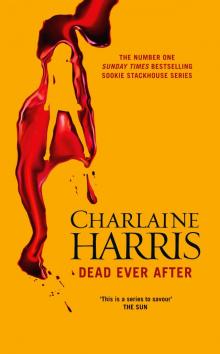 Dead Ever After
Dead Ever After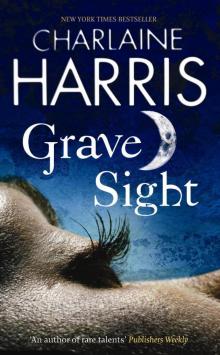 Grave Sight
Grave Sight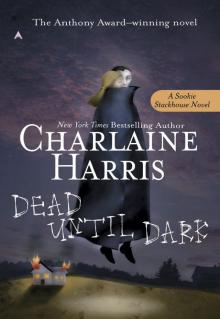 Dead Until Dark
Dead Until Dark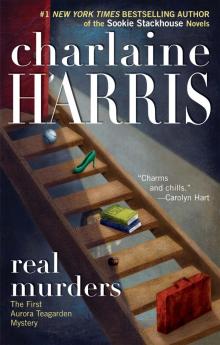 Real Murders
Real Murders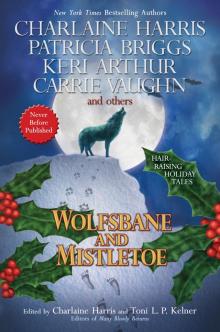 Wolfsbane and Mistletoe
Wolfsbane and Mistletoe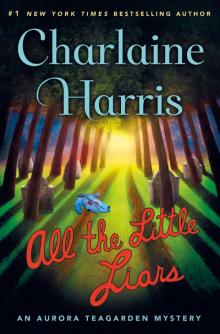 All the Little Liars
All the Little Liars Dead to the World
Dead to the World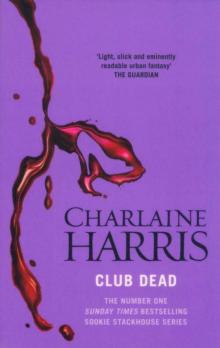 Club Dead
Club Dead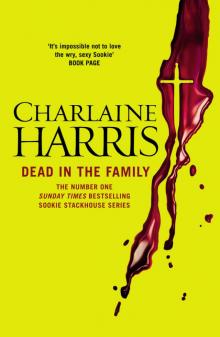 Dead in the Family
Dead in the Family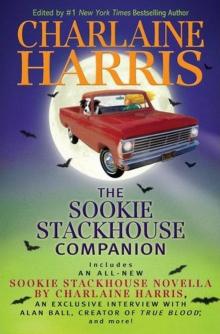 The Sookie Stackhouse Companion
The Sookie Stackhouse Companion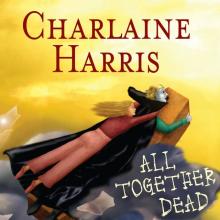 All Together Dead
All Together Dead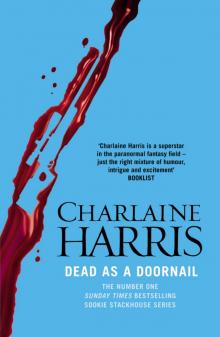 Dead as a Doornail
Dead as a Doornail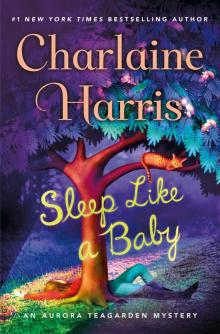 Sleep Like a Baby
Sleep Like a Baby Night Shift
Night Shift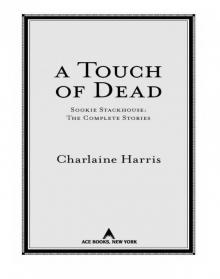 A Touch of Dead
A Touch of Dead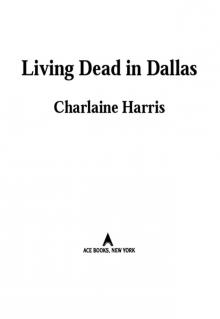 Living Dead in Dallas
Living Dead in Dallas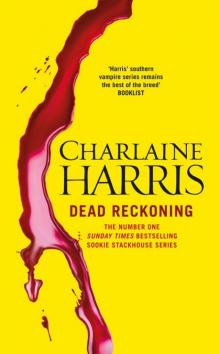 Dead Reckoning
Dead Reckoning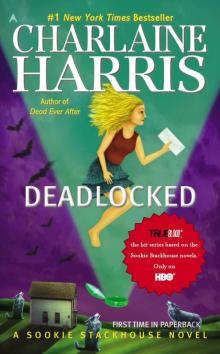 Deadlocked
Deadlocked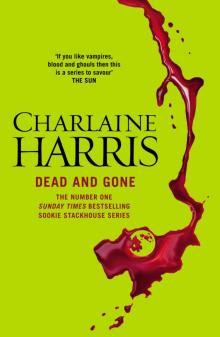 Dead and Gone
Dead and Gone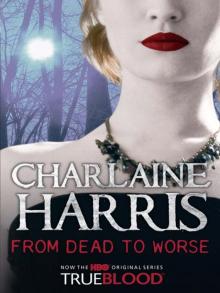 From Dead to Worse
From Dead to Worse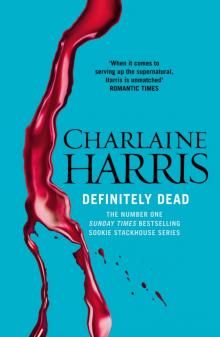 Definitely Dead
Definitely Dead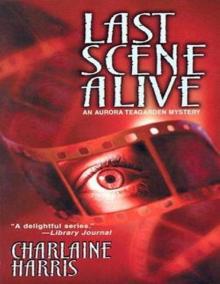 Last Scene Alive
Last Scene Alive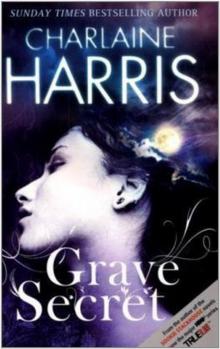 Grave Secret
Grave Secret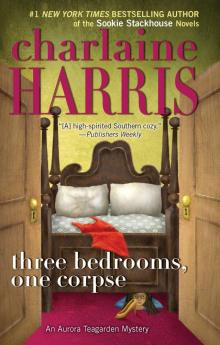 Three Bedrooms, One Corpse
Three Bedrooms, One Corpse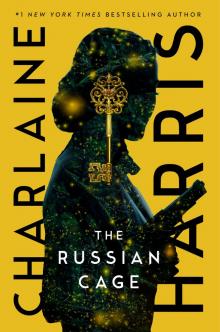 The Russian Cage
The Russian Cage Shakespeares Counselor
Shakespeares Counselor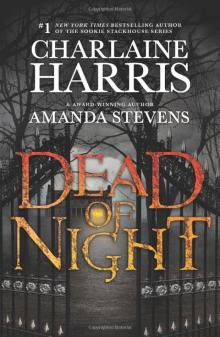 Dead of Night
Dead of Night Shakespeares Trollop
Shakespeares Trollop One Word Answer
One Word Answer Shakespeares Champion
Shakespeares Champion Shakespeares Christmas
Shakespeares Christmas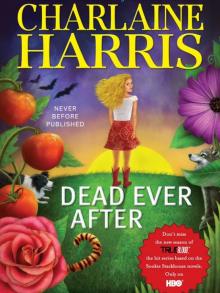 Shakespeares Landlord
Shakespeares Landlord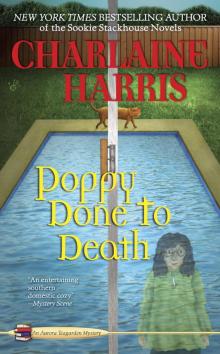 Poppy Done to Death
Poppy Done to Death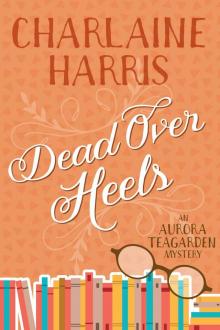 Dead Over Heels
Dead Over Heels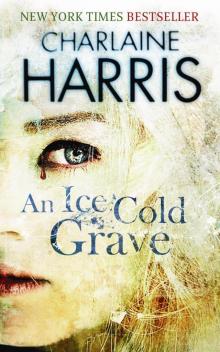 An Ice Cold Grave
An Ice Cold Grave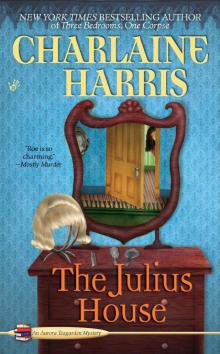 The Julius House
The Julius House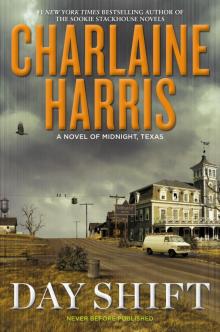 Day Shift
Day Shift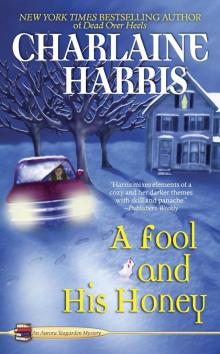 A Fool And His Honey
A Fool And His Honey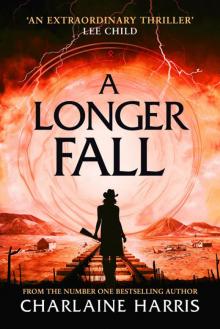 A Longer Fall (Gunnie Rose)
A Longer Fall (Gunnie Rose)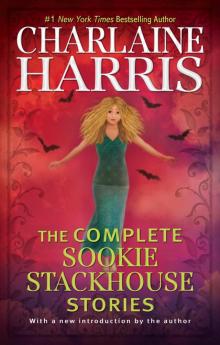 The Complete Sookie Stackhouse Stories (Sookie Stackhouse/True Blood)
The Complete Sookie Stackhouse Stories (Sookie Stackhouse/True Blood)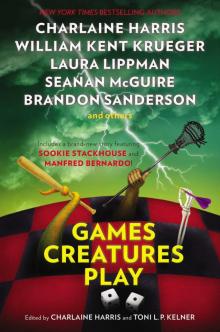 Games Creatures Play
Games Creatures Play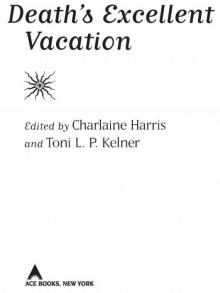 Death's Excellent Vacation
Death's Excellent Vacation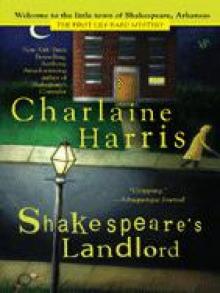 (LB2) Shakespeare's Landlord
(LB2) Shakespeare's Landlord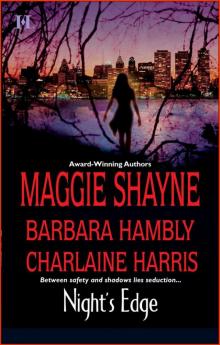 Dancers In The Dark - Night's Edge
Dancers In The Dark - Night's Edge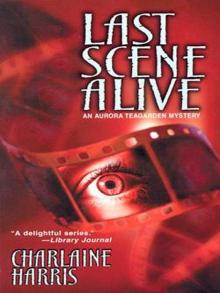 Last Scene Alive at-7
Last Scene Alive at-7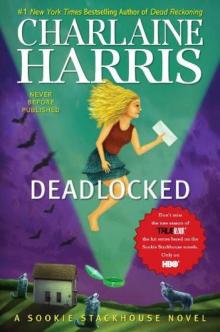 Deadlocked: A Sookie Stackhouse Novel
Deadlocked: A Sookie Stackhouse Novel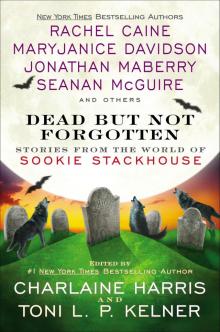 Dead But Not Forgotten
Dead But Not Forgotten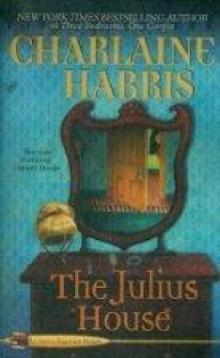 (4/10) The Julius House
(4/10) The Julius House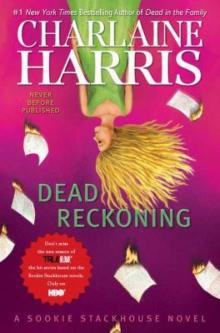 Dead Reckoning: A Sookie Stackhouse Novel
Dead Reckoning: A Sookie Stackhouse Novel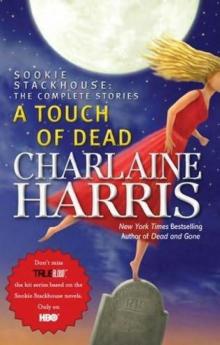 A Touch of Dead (sookie stackhouse (southern vampire))
A Touch of Dead (sookie stackhouse (southern vampire))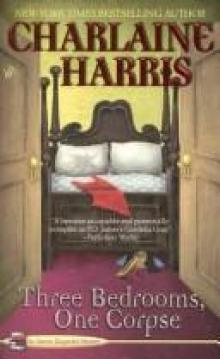 (3T)Three Bedrooms, One Corpse
(3T)Three Bedrooms, One Corpse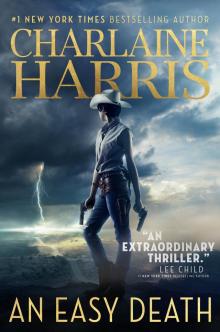 An Easy Death
An Easy Death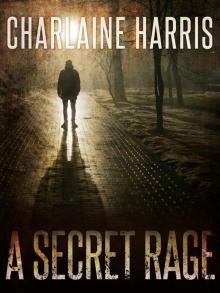 A Secret Rage
A Secret Rage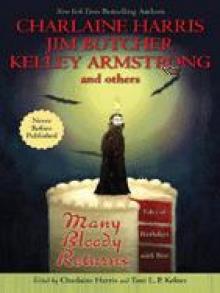 Many Bloody Returns
Many Bloody Returns![Harper Connelly [3] An Ice Cold Grave Read online](http://i1.bookreadfree.com/i/03/25/harper_connelly_3_an_ice_cold_grave_preview.jpg) Harper Connelly [3] An Ice Cold Grave
Harper Connelly [3] An Ice Cold Grave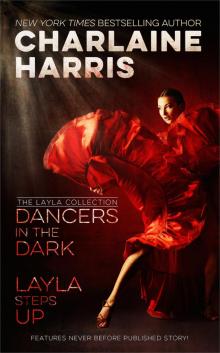 Dancers in the Dark and Layla Steps Up
Dancers in the Dark and Layla Steps Up Small Kingdoms and Other Stories
Small Kingdoms and Other Stories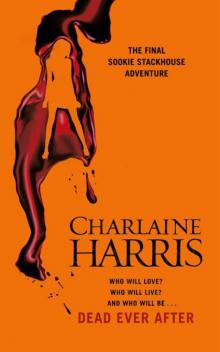 Dead Ever After: A Sookie Stackhouse Novel
Dead Ever After: A Sookie Stackhouse Novel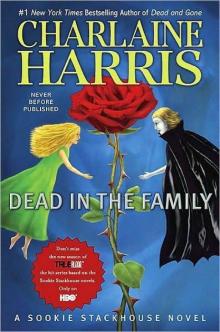 Dead in the Family ss-10
Dead in the Family ss-10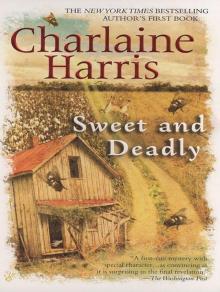 Sweet and Deadly aka Dead Dog
Sweet and Deadly aka Dead Dog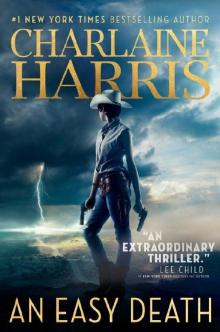 An Easy Death (Gunnie Rose #1)
An Easy Death (Gunnie Rose #1)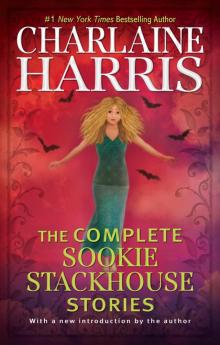 The Complete Sookie Stackhouse Stories
The Complete Sookie Stackhouse Stories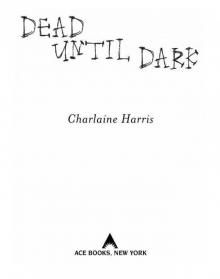 Sookie Stackhouse 8-copy Boxed Set
Sookie Stackhouse 8-copy Boxed Set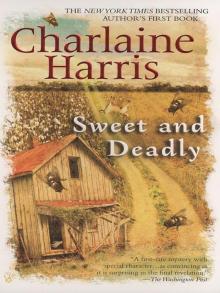 Sweet and Deadly
Sweet and Deadly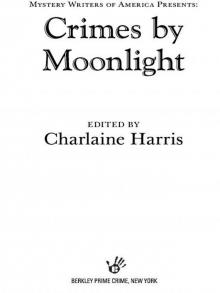 Crimes by Moonlight
Crimes by Moonlight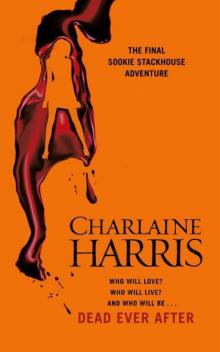 Dead Ever After: A True Blood Novel
Dead Ever After: A True Blood Novel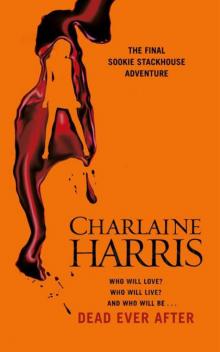 Dead Ever After ss-13
Dead Ever After ss-13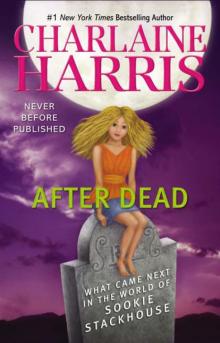 After Dead
After Dead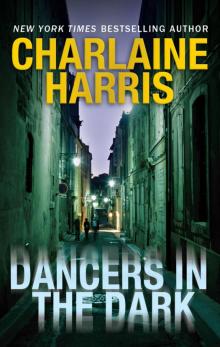 Dancers in the Dark
Dancers in the Dark (LB1) Shakespeare's Champion
(LB1) Shakespeare's Champion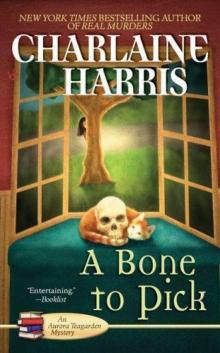 A Bone to Pick (Teagarden Mysteries,2)
A Bone to Pick (Teagarden Mysteries,2)